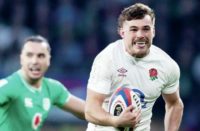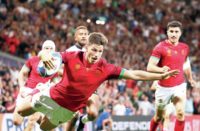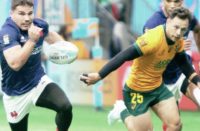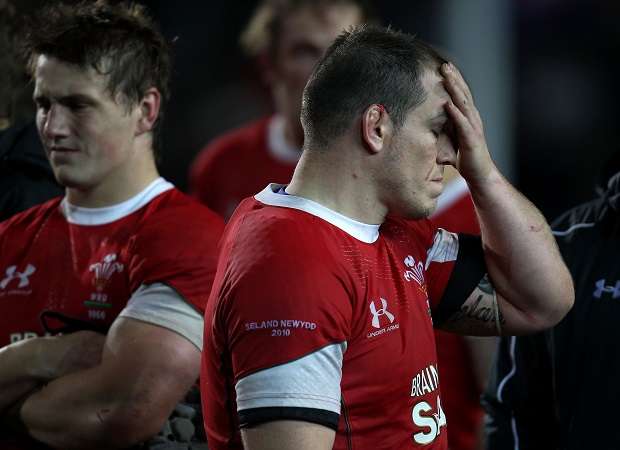 Wales don't travel to New Zealand often and when they do it's usually calamitous but history will show that their first ever tour in 1969 was a watershed moment.
Wales don't travel to New Zealand often and when they do it's usually calamitous but history will show that their first ever tour in 1969 was a watershed moment.
Before shoehorning themselves into their economy seats and making the 54- hour flight to New Plymouth via Tehran, New Delhi, Singapore, Sydney and Auckland, the Welsh had enjoyed parity with New Zealand having won three Tests apiece since their first game in 1905. Thereafter they have lost 24 Tests on the trot in the last 47 years against the All Blacks.
The irony of that 1969 squad was that it contained the genesis of Wales' greatest ever team, it was chockful of legends on the cusp of great things – JPR Williams, Gareth Edwards, Barry John, Phil Bennett, Mervyn Davies, Gerald Davies, John Dawes, John Taylor, Delme Thomas and Dai Morris and also contained two of greats who went ‘North' – Keith Jarrett and Maurice Richards. But even they couldn't live with the Kiwis although the bitter experience and lessons learned was undoubtedly the making of their Seventies Dream Team.
You could never accuse the WRU of giving the 1969 itinerary much thought and within three days of arriving jet lagged and bent double in New Plymouth – tremors from an earthquake disrupted their first night's sleep there – Wales were playing in front of 30,000 fans at Rugby Park where they somehow kept awake long enough to force a plucky 9-9 draw against Taranaki. Even before the first match kicked off the tour was being dubbed a suicide mission.
Just four days later it was the first Test at Lancaster Park in Christchurch were they leaked four tries and got beaten 19-0. Yes Jarrett had a rare poor day with the boot and missed five penalty shots which would have given a veneer of respectability to the score but Wales were outclassed which came as a huge shock for a side that had just won the Triple Crown and been denied the Grand Slam only when they drew against France in Paris.
Wales couldn't handle the pace, raw strength and rucking of the New Zealand pack nor the All Blacks propensity to violence. Hooker Geoff Young had his jaw broken by a Colin Meads punch when he got involved in a bit of shirt-pulling with his opposite number Bruce McLeod. Referee Pat Murphy looked on apparently unconcerned.
The All Blacks were undoubtedly pumped up. It was Wales' first visit to New Zealand and remarkably their two Tests against the Welsh were New Zealand's only two internationals of the calendar year. There was a lot of emotion flying around.
Having finally shaken off the effects of jetlag, Wales rallied to produce two outstanding wins against strong Otago and Wellington sides – the latter had seen off the Springboks and Lions in recent season – and that potent backline was beginning to purr. Richards in particular impressed New Zealand fans as one of the best wings they had seen but then Wales skipper John Dawes gave the New Zealand media a soundbite he was quickly to regret.
“You give us 40 per cent and we will beat New Zealand by 30 points,” said Dawes in a gush of ill-considered hyperbole when what he probably meant was that if Wales could just secure parity up front they had the backs to finish off even New Zealand. Predictably his comments went down like a lead balloon and come the second Test at Eden Park in Auckland no motivating speech was required from All Blacks skipper Brian Lochore. Wales were on a hiding to nothing,
Not that you would know from the score line but Wales actually played a good deal better. They were outscored three tries to two with their brace coming from the duo who were heading North – Richards and Jarrett – but on this occasion incurred the wrath of Mr Murphy as full-back Fergie McCormick kicked 24 points, a haul which included five penalties and a drop goal which Mr Murphy appeared to greet with a rather embarrassing jump for joy.
Dawes raged against the referee afterwards but Wales tour manager Handel Rogers probably hit the target best with his dry comment that “Mr Murphy had performed his duties to the best of his abilities”.
Rogers, incidentally, was one of just three survivors from the Llandow air crash in 1950 when 80 Wales supporters were killed flying back from Wales' Triple Crown match in Dublin the previous day
The moans against the ref were justified although the New Zealand public found them tiresome and the itinerary early on was a joke but the bitter truth was also that a very good Wales team – which still raised a gallop to beat Australia and Fiji on the way home – came a distant second to New Zealand.
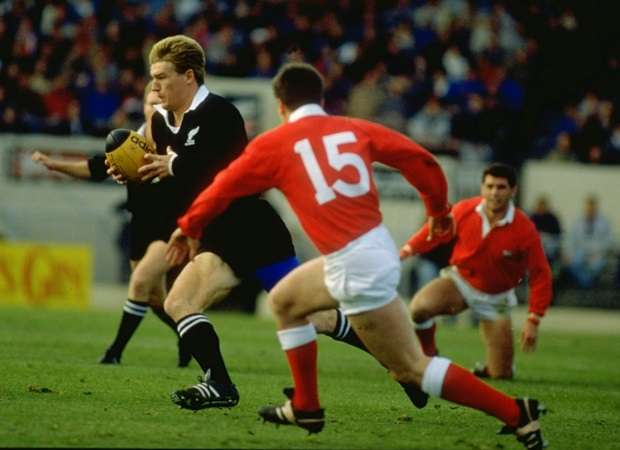 It was a seminal moment but important lessons had been learned and a hardness forged in the heat of battle. In the next three years and 15 Tests Wales lost just once – away to Ireland in 1970 before they met New Zealand again. And lost again, this time 19-16 at the Arms Park against a New Zealand team that were there for the beating.
It was a seminal moment but important lessons had been learned and a hardness forged in the heat of battle. In the next three years and 15 Tests Wales lost just once – away to Ireland in 1970 before they met New Zealand again. And lost again, this time 19-16 at the Arms Park against a New Zealand team that were there for the beating.
As flanker Dai Morris put it rather pointedly: “A few of us were determined that we would never again capitulate as we had done in New Zealand. That tour was the birth of the successful 1970 team.”
The 1969 New Zealand tour spawned a physicality and ruthlessness up front which had been missing from Wales' game and which often gets overlooked when we assess their glorious march through much of the 70s. The emergence of hard man Mervyn Davies was arguably the biggest “find” of the tour along with the switching of Gerald Davies in the last Test from centre to wing where his jinking and electric steps could cause maximum havoc.
It was another 19 years before Wales ventured down to New Zealand again and in many ways history repeated itself. They were the Triple Crown champions, being denied a Grand Slam only by a 10-9 defeat to France on the final day, and had finished third in the inaugural World Cup the previous year but there was still a sense of foreboding as they gathered for a training weekend and farewell barbeque at the house of tour manager Rod Morgan.
That World Cup campaign had included a crushing 49-6, eight tries to one, semi-final defeat against New Zealand in Brisbane, the memory of which left some Welsh players waking up in a cold sweat at night.
A year later it was the same old story. Wales possessed a potentially devastating back division – Robert Jones, Jonathan Davies, John Devereux, Mark Ring, Ieuan Evans, Glen Webbe et al but couldn't get their hands on the ball. Yet again they were completely outplayed up front and yet again the administrators stitched the team up with an ill-considered itinerary. This time they stepped off the plane and went straight into three games in eight days against the then three strongest provincial sides in New Zealand – Waikato, Wellington and Otago.
Those eight days also included three days travelling. All Blacks coach Alex Wyllie made it quite clear before the tour started that he would never have agreed to such a schedule for his team. The result was two confidence destroying defeats and a scrambled win against Otago. Come the first Test in Christchurch – the fourth change of venue and internal flight in ten days, Wales were ripe for the picking.
World Champions New Zealand happily gorged on the low hanging fruit and dismissed Wales with embarrassing ease to win 52-3, scoring ten tries with John Kirwan amassing four. Wales barely fired a shot with just a Mark Ring penalty to show for their efforts.
It was a devastating blow for a side that had shown real promise in the Five Nations just three months earlier but there was no escaping the nightmare. Two weeks later in Eden Park there was a repeat performance, this time New Zealand scoring just the eight tries in their 54-9 win at Eden Park. It was horrible and you could argue that Wales didn't really recover until Mike Ruddock conjured a Grand Slam seemingly out of nowhere in 2005. It certainly heralded some very dark years for the Welsh.
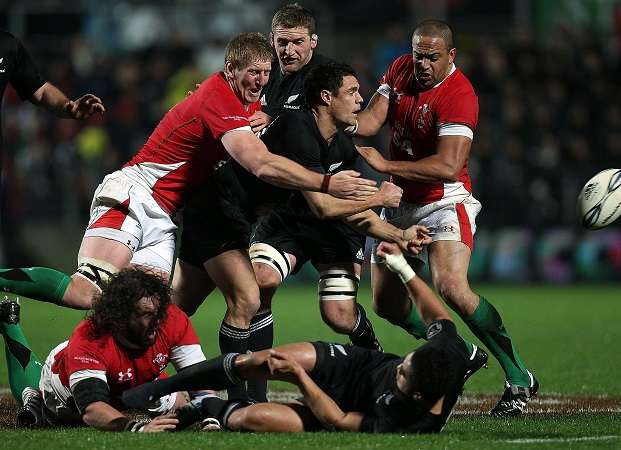 That period included a one off Test in New Zealand in 2003 when Wales were on the end of a Kiwi backlash after the All Blacks had lost to England in Wellington the previous week. This time despite plenty of heroic defence Wales went down 55-3, conceding another eight tries as New Zealand, with a young Dan Carter winning his first start, let rip.
That period included a one off Test in New Zealand in 2003 when Wales were on the end of a Kiwi backlash after the All Blacks had lost to England in Wellington the previous week. This time despite plenty of heroic defence Wales went down 55-3, conceding another eight tries as New Zealand, with a young Dan Carter winning his first start, let rip.
Mathematically it was Wales' heaviest defeat on New Zealand soil to date although there was a certain defiance about the performance that lessened the impact and, after a trot of eight consecutive Test defeats going into the game, Welsh expectations were low and a gallows humour has already set in.
Which brings us to Wales' last visit in 2010 which was neither one thing nor another. That man Carter was pulling the strings as New Zealand strolled to a 42-9 win in Dunedin with their fly-half scoring two of their five tries and finishing with 27 points in total as Shaun Edward's much vaunted defence crumbled after a long season.
There was more resistance in Hamilton the following week when Wales restricted the score to 29-10, a performance that hinted at better things ahead, which duly arrived with a strong performance at RWC2011 in New Zealand the following year.


